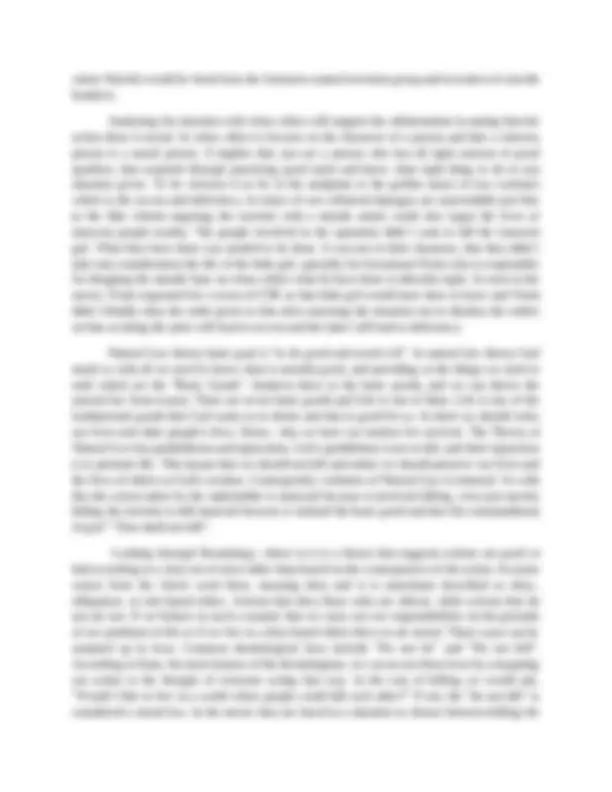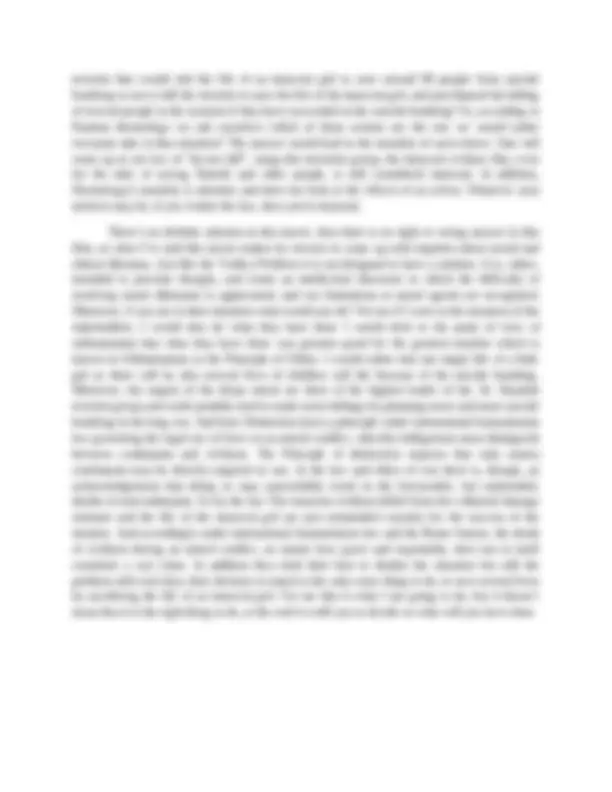




Study with the several resources on Docsity

Earn points by helping other students or get them with a premium plan


Prepare for your exams
Study with the several resources on Docsity

Earn points to download
Earn points by helping other students or get them with a premium plan
Community
Ask the community for help and clear up your study doubts
Discover the best universities in your country according to Docsity users
Free resources
Download our free guides on studying techniques, anxiety management strategies, and thesis advice from Docsity tutors
This document discusses the four classical ethical theories namely the Utilitarianism, Virtue ethics, Deontology and Natural law theory by incorporating each in the story of the Eye in the Sky movie.
Typology: Exams
1 / 4

This page cannot be seen from the preview
Don't miss anything!



Eye in the Sky A Moral Deliberation The film Eye in the Sky makes its viewers to think and question about moral and ethical dilemma of modern warfare. It was an amazing film that shows the future of modern drone warfare. The situation given in the film is kind of similar to the trolley problem; a famous thought experiment in ethics modeling ethical dilemma and it is usually used to represent the clash between the utilitarianism and deontology. Unlike from the movie, in trolley problem the setup is in a normal runway tracks while in the film it is in a friendly city of Kenya that will be turn into a battle field. A UK based military officer Colonel Catherine Powell, is in command of a top secret drone operation for capturing three of the ten highest-level Al-Shabaab leaders, who are meeting in a safehouse in Nairobi, Kenya. Together with a multinational team that also works in this capture mission are connected together by video and voice systems. An aerial surveillance is provided by a USAF MQ-9 Reaper drone controlled from Creech Air Force Base in Nevada by Second Lieutenant Steve Watts. Undercover Kenyan field agents, including Jama Farah, use short-range ornithopter and insectothopter cameras to link in ground intelligence. Kenyan special forces are positioned nearby to make the arrest. Facial recognition to identify human targets is done at Joint Intelligence Center Pacific at Pearl Harbor in Hawaii. The mission is supervised in the United Kingdom by a Cabinet Office Briefing Room A COBRA meeting that includes British Lieutenant General Frank Benson, two full government ministers and a ministerial under- secretary. As Powell discovers the targets are planning a suicide bombing the decision of mission to capture was change to mission to kill. With this Powell requested to prepare a missile attack, and ask for permission to launch the missile from British Army legal counsel. To her frustration, her counsel advises her to seek approval from superiors. In the briefing room, Benson asks permission from the COBRA members, the cabinets are having a discussion on whether to kill the terrorist, as if they are afraid in taking the responsibility. In this part of the film, it shows the dilemma of these officials in deciding what to do. Someone argued that one of the target is a American citizen and one of them said that in his view all of the legal criteria for an attack have been met, accordingly it was a military necessity, there is no reasonable alternative, and the force to be used is in proportion to the threat. But someone disagree, stating that “Has there ever been a British led drone attack on a city in a friendly country that is not at war?” They failed to have a decision and result to refer the question up to the UK Foreign Secretary, who is in a trade mission to Singapore. He does not offer a definite answer as he cannot authorize a missile attack on an American Citizen and he defers to the United States Secretary, who immediately declares that by joining the Al- Shabaab the American suicide bomber is an enemy of the state this means that they got the permission to drop the missile but the COBRA should take due diligence to minimize collateral damage.
At the midst of dropping the missile, a nine year old girl named Alia enters the kill zone to sells her mother's bread. The soldier who is responsible in dropping the missile asked to rerun a Collateral Damage Estimate that leads to hold the weapon for a meanwhile. Farah is directed to try and buy all of Alia's bread so she will leave but it wasn’t successful. On the other hand, in the COBRA, members are arguing on whether to delay the attack and wait for the little girl to leave or to already attack because these terrorists can leave at any moment. In this scenario from the film it was said is that there a legal basis for waiting and giving the little girl to sell her bread and leave but it doesn’t mean that there is no legal basis for releasing the weapon already. The question now is should they wait or not? They are now being torn with this decision, and for undersecretary Angela, it is just to be assumed that there are an average of 80 people will die from the suicide bombing of these terrorist but what is certain is that there is one girl who will die when they act already. For Angela she would risk the lives of 80 people to save the little girl and blame the terrorist for the suicide bombing rather than to defend a drone attack by the forces that kill an innocent girl. Angela has a compelling opinion. As what have said in the film if the terrorist kill 80 people the government win the propaganda war but if they sacrifice and let Alia die then the terrorist win the propaganda war. With this they waited for Alia to sell all her bread while Powell seeking authorization to execute the strike, orders her risk-assessment officer to find parameters that will let him quote a lower 45% risk of civilian deaths. He re-evaluates the strike point and assesses the probability of Alia's death at 45–65%. She makes him confirm only the lower figure, and then reports this up the chain of command. Now the strike is authorized, and Watts fires a missile. And eventually after doing everything they can, Alia met her fate and die at the end of the movie because of the missile. The question and moral issue that was left to us as the film finished is that, is it morally justifiable to let an innocent civilian to be killed and to kill the terrorist in saving an average 80 people from the planned suicide bombing of the terrorist? if you are in their situation would you also sacrifice one life for several others? In answering this we will going to apply the four classical ethical theories namely the Utilitarianism, Virtue ethics, Deontology and Natural law theory. Utilitarianism is a form of consequentialism which means whether an action is morally right or wrong depends entirely on its consequences. An action is right if it brings about the best outcome of the choices available. Otherwise it is wrong. Base from this definition we can say that, what they have done in the movie is morally right. Utilitarians believe in the principle of utility, where in the purpose of morality is to make existence easier by increasing the sum of good things in the world (such as enjoyment and happiness) and reducing the quantity of negative things (such as suffering and unhappiness). Just like what happened in the movie they have increased the amount of happiness in the world by deciding to escalate the mission from capture to kill and with the permission of the cabinet and higher ups they have saved more people by killing the terrorist and an innocent civilian. Some may argue that they should just proceed with their initial plan which is to capture, because it's not moral to kill the innocent. But utilitarians would argue that, the action taken was moral due to its utility at the end of the day,
terrorist that would risk the life of an innocent girl to save around 80 people from suicide bombing or not to kill the terrorist to save the life of the innocent girl, and just blamed the killing of several people to the terrorist if they have succeeded in the suicide bombing? So, according to Kantian deontology we ask ourselves which of these actions are the one we would rather everyone take in that situation? The answer would lead to the morality of each choice. One will come up to use law of “do not kill”, using this terrorists group, the innocent civilian Alia, even for the sake of saving Nairobi and other people, is still considered immoral. In addition, Deontology's morality is absolute and does not look at the effects of an action. Whatever your motives may be, if you violate the law, then you're immoral. There’s no definite solution in this movie, thus there is no right or wrong answer in this film, as what I’ve said this movie makes its viewers to come up with inquiries about moral and ethical dilemma. Just like the Trolley Problem it is not designed to have a solution. It is, rather, intended to provoke thought, and create an intellectual discourse in which the difficulty of resolving moral dilemmas is appreciated, and our limitations as moral agents are recognized. Moreover, if you are in their situation what would you do? For me if I were in the situation of the stakeholders, I would also do what they have done I would stick to the point of view of utilitarianism that what they have done was greatest good for the greatest number which is known in Utilitarianism as the Principle of Utility. I would rather risk one single life of a little girl as there will be also several lives of children will die because of the suicide bombing. Moreover, the targets of the drone attack are three of the highest leader of the Al- Shaabab terrorist group and could possibly lead to make more killings by planning more and more suicide bombing in the long run. And base Distinction (law) a principle under international humanitarian law governing the legal use of force in an armed conflict, whereby belligerents must distinguish between combatants and civilians. The Principle of distinction requires that only enemy combatants may be directly targeted in war. In the law and ethics of war there is, though, an acknowledgement that doing so may unavoidably result in the foreseeable, but unintended, deaths of noncombatants. So by the law The innocent civilians killed from the collateral damage estimate and the life of the innocent girl are just unintended casualty for the success of the mission. And accordingly under international humanitarian law and the Rome Statute, the death of civilians during an armed conflict, no matter how grave and regrettable, does not in itself constitute a war crime. In addition they tried their best to deaden the situation but still the problem still exist thus, their decision to attack is the only wiser thing to do, to save several lives by sacrificing the life of an innocent girl. For me this is what I am going to do, but it doesn’t mean that it is the right thing to do, at the end it is still you to decide so what will you have done